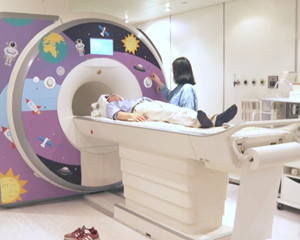On the campus of the National University of Singapore, Professor Helen Zhao and a team of researchers say artificial intelligence is letting them see, well, a version of our thoughts.
新加坡国立大学的Helen Zhao教授和一组研究人员表示,人工智能将人类想象中的情景呈现在了他们眼前。
Using a database of fMRI scans, the AI first got to see what people's brains looked like as they viewed more than 1,000 photos.
通过使用功能磁共振成像机扫描数据库,人工智能首先可以看到了人们在观看1000多张照片时的大脑是什么样子。
Then, it was shown only brain scans as the subjects looked at new photos.
然后,在受试者观看新照片时,只向人工智能展示脑部扫描结果。
Using a special language of brain activity the team developed, an image generator called "Stable Diffusion" then trying to recreate what each new photo had shown.
通过利用一种该团队开发的、特殊的大脑活动语言,一种名为“稳定扩散”的图像生成器来尝试重现每张新照片的内容。
Scientists have pursued this for years, but AI makes the difference.
多年来,科学家们一直在向着这个目标努力,但人工智能带来了改变。

Here's a giraffe shown to a subject. Now, ready? Here's the image the AI created, and it is sometimes very different between people.
这是给受试者看的长颈鹿。准备好了吗?这是人工智能创造的图像,有时会与人看到的实际图像区别很大。
Here's the original image of a grassy field, now here's three different versions generated from three different people's brain activity.
这是一片草地的原始图像。这是三个不同的版本,是由三个不同的人的大脑活动生成的。
Now what you're seeing is a recording of previous scans, not a real-time demonstration.
你看到的是之前扫描大脑的记录,而不是实时演示。
And this process is slow, it requires an expensive machine and it has to be individually tailored.
整个过程会很慢,需要昂贵的机器,而且必须单独定制。
At the University of Texas, another team is learning to pull word sequences using a similar technique.
在德克萨斯大学,另一个团队正在学习使用类似的技术提取单词序列。
And a multi-university team last year founded in fMRI tests, these regions of the brain reliably predicted whether a subject leaned liberal or conservative.
去年,一个由多所大学组成的团队在功能磁共振成像测试中发现,大脑的这些区域能够可靠地表明受试者倾向自由派还是保守派。












